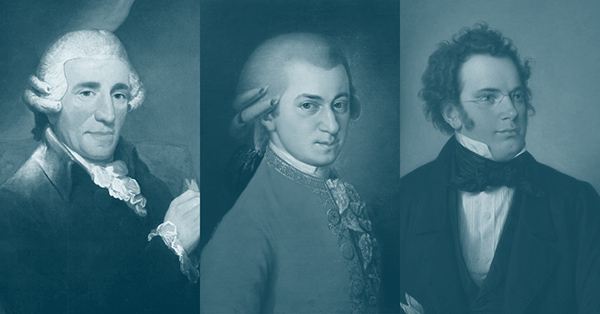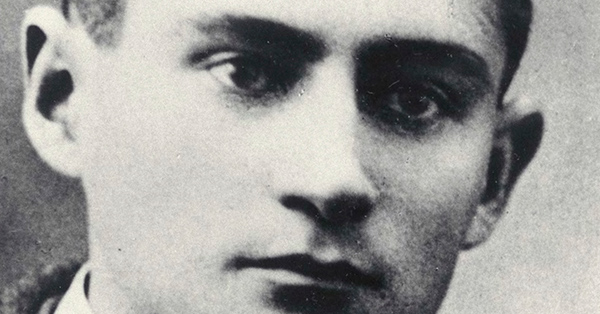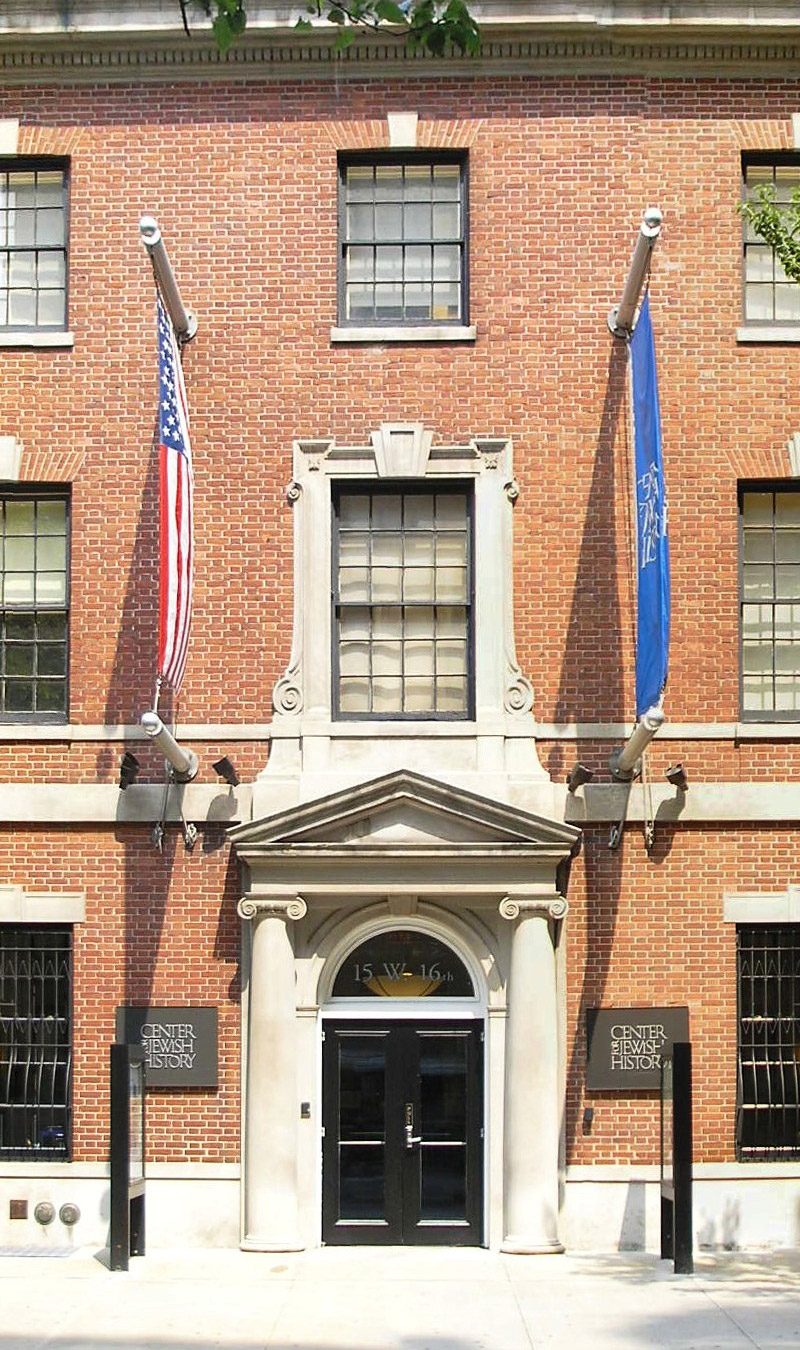lecture

The Golden Age of Classicism: Phoenix Chamber Ensemble Performs Music by Haydn, Mozart, and Schubert – In Person and Live on YouTube
Join Phoenix Chamber Ensemble pianists Vassa Shevel and Inessa Zaretsky and guest artists Titilayo Ayangadeon cello, Edwin Kaplan on viola, and Risa Schuchter on violin.
Program:
Franz Schubert: Sonatina in A Minor, D.385 for violin and piano
Joseph Haydn: Piano Trio in C Major, Hob. XV: No.21
Franz Schubert: Ständchen, arranged for viola and piano
Wolfgang Amadeus Mozart: Piano Quartet in G Minor, K.478
Founded in 2005 by pianists Vassa Shevel and Inessa Zaretsky, the Phoenix Chamber Ensemble has, over the course of two decades, become a vital part of the New York classical community, presenting more than 70 public concerts at the Center for Jewish History. The ensemble has garnered a devoted following with its innovative programming and sensitive interpretations, earned an international reputation presenting concerts in Russia, Poland, Italy, and other European venues, and collaborated with numerous acclaimed guest artists, including clarinetist David Krakauer, the Grammy-nominated Enso Quartet, the Tesla Quartet, members of the Jasper String Quartet, the New York Little Opera Company, the Metropolitan Opera, and New York City Ballet.
Made possible by the Stravinsky Institute Foundation through the generous support of the Blavatnik Family Foundation. Presented in partnership with the Leo Baeck Institute.
Ticket Info:
In person: $15 general; $13 senior/student; $12 members; register here
YouTube livestream: Pay what you wish; register here
Presented by:

lecture
lecture
Der oytser formen baym moler: Ryback's Formal Approach to Jewish Art - Live on Zoom
The visual and plastic works, as well as writings, of Jewish Ukrainian artist Issachar Ber Ryback (1897-1935) present a formal approach to national art, diverging from prevalent depictions of Jewish identity. Spanning illustration, drawing, painting, sculpture, stage design and theoretical writing, Ryback’s diverse body of work brings to the fore a material cult of everyday Eastern European Jewish life that was often overlooked. Central to the discussion is Shtetl, mayn khorever heym: a gedekhenish (Shtetl: My Destroyed Home, a Recollection), a lithograph album, conceived in 1917 within the Pale of Settlement and published in Berlin six years later in 1923. By closely analyzing the lithographs and Ryback’s contemporaneous writing, Noa Tsaushu examines the ways in which the artist exploited notions of materiality and visual representation to defy conventions of monolithic medium, push back against the Western European paradigm of Jewish aniconism, and challenge the hegemony of text as the Jewish medium of choice.
About the Speaker
Noa Tsaushu is a doctoral student of Yiddish Studies at Columbia University. She earned her master’s degree in Jewish Studies from Bar Ilan University, and her bachelor’s degree in fine art from the Bezalel Academy of Arts and Design, Jerusalem. Guided by a comparative approach to cultural production, Noa specializes in modern Jewish art and Yiddish literature. Her dissertation, titled “Yiddish Art: The Desire for Cohesion among the Soviet-Yiddish Avant-Garde,” presents a theoretical framework for understanding the Yiddish avant-garde movement, a phenomenon in modern Yiddish culture that has been primarily approached in scholarship through historical and literary lenses. Noa is this year’s recipient of the Ruth and Joseph Kremen Memorial Fellowship in East European Arts, Music, and Theater at the YIVO Institute for Jewish Research. She recently translated and contributed to a volume of works from the Merrill C. Berman Collection titled Jewish Artists, Jewish Identity, 1917–1931.
Ticket Info: Free - registration is required
Presented by:

lecture
lecture
Jewish Self-Defense in the Russian Empire 1903-1905 - Live on Zoom
The phenomenon of self-defense against anti-Jewish violence prior to World War II has remained a largely unexplored topic. This presentation will delve into the history of Jewish local guard and self-defense units in Jewish communities in the Russian Empire before and during the failed 1905 revolution. Among the issues discussed will be the formation and leadership of Jewish self-defense units, the political and socio-economic background of their members, as well as contemporaneous Jewish discourse and debate on both the efficacy and the necessity of self-defense. By shedding light on Jewish resistance to pogroms through analysis of a variety of primary sources, Netta Ehrlich will contribute to our understanding of the development of Jewish self-defense both in theory and in practice.
About the Speaker
Netta Ehrlich is a doctoral candidate and MacCracken Fellow at the Skirball Department of Hebrew and Judaic Studies, NYU. Her dissertation focuses on self-defense in modern East European Jewish History. She has worked previously as an instructor and as a developer of educational programs at the Yad Vashem International School for Holocaust Studies. Netta is the 2023-2024 recipient of the Professor Bernard Choseed Memorial Fellowship and the Natalie and Mendel Racolin Memorial Fellowship at the YIVO Institute for Jewish Research.
Ticket Info: Free; registration is required
Presented by:

lecture
lecture
Self-Government between the Shtetl and the Village: Rural Leaders and Jewish-Polish Relations in the Lublin Countryside before World War II - Live on Zoom
The village head (in Polish: soltys) was a familiar feature of life in the countryside of the Second Polish Republic and a leader who shaped the daily lives of rural inhabitants through wide ranging economic, social, and security responsibilities. This lecture will offer initial reflections on the role and significance of Christian and Jewish village heads in prewar village and town societies in the Lublin region, as well as introduce Miranda Brethour’s dissertation project on the collaboration of rural institutions with the German occupiers during the Holocaust in Poland. Considering an array of sources, including prewar memoirs, religious and secular self-government records, and court files, Brethour will describe how rural leadership—such as the village head—was an important site of interaction between Jews and Christians in the Lublin countryside leading up to German occupation.
About the Speaker
Miranda Brethour is a PhD Candidate at the City University of New York’s Graduate Center writing a dissertation on rural Polish self-government and the Holocaust in the Lublin region. She received her BA (2017) and MA (2019) in History from the University of Ottawa in Canada. Her dissertation, entitled “Faithful German Servants” or “Good Polish Citizens”? Violence, the Village Head, and Daily Life in Interwar and Occupied Poland, 1918 to 1956, has been supported by fellowships from the United States Holocaust Memorial Museum’s Mandel Center for Advanced Holocaust Research, the Central European History Society, and the Social Sciences and Humanities Research Council of Canada. She is also the recipient of the 2023-2024 Fellowship in Polish Jewish Studies at the YIVO Institute for Jewish Research.
Ticket Info: Free; registration is required.
Presented by:

lecture
lecture

65th Leo Baeck Memorial Lecture by Hillel Kieval - In-person and Live on Zoom
About the Lecture
Still Reading Kafka? On Language, Literature, Friendship, and Identity in Central Europe
To pick up and read the novels or short stories of Franz Kafka hardly needs justification. His standing as one of the last century’s most important writers is assured. The question is: What can Kafka’s writings and the various contexts in which his life transpired—linguistic, familial, cultural, political—reveal about the textures of Jewish life in Central Europe at the turn of the century? In the 65th Annual Leo Baeck Memorial Lecture, Hillel Kieval (Washington University in St. Louis) revisits crucial aspects of Kafka’s life, work, and intellectual relationships, to explore what it meant to be both Jewish and a citizen of Prague before and after the First World War.
The Leo Baeck Memorial Lecture is endowed by Marianne C. Dreyfus and Family, the descendants of Rabbi Leo Baeck
About the Speaker
Hillel J. Kieval is the Gloria M. Goldstein Professor Emeritus of Jewish History and Thought at Washington University in St. Louis. Over the course of his career, has held visiting appointments at Charles University in Prague, the École des Hautes Études en Sciences Sociales in Paris, the Hebrew University of Jerusalem, the Universidad Hebraica in Mexico City, Vilnius University in Lithuania, and the Center for Advanced Judaic Studies at the University of Pennsylvania.
Hillel Kieval’s research interests focus on Jewish culture and society in Central and East-Central Europe in the nineteenth and twentieth centuries. They range from pathways of Jewish acculturation and integration to the impact of nationalism and ethnic conflict on modern Jewish identities, and from cross-cultural conflicts and misunderstandings to the discursive practices of modern antisemitism. His books include Blood Inscriptions: Science, Modernity, and Ritual Murder at Europe’s Fin de Siècle (2022); Prague and Beyond: Jews in the Bohemian Lands (Co-editor, 2022); Languages of Community: The Jewish Experience in the Czech Lands (2000); and The Making of Czech Jewry: National Conflict and Jewish Society in Bohemia, 1870-1918(1988).
In May 2022, Prof. Kieval was awarded the Silver Medal of the Faculty of Arts, from Charles University of Prague.
Ticket Info: Free; registration required
Presented by:

lecture
book talk
Neo-Nazi Terrorism and Countercultural Fascism - Live on Zoom
A new wave of aspiring neo-Nazi terrorists has arisen—including the infamous Atomwaffen Division, and they have a bible: James Mason’s Siege, which praises terrorism, serial killers, and Charles Manson. Neo-Nazi Terrorism and Countercultural Fascism: The Origins and Afterlife of James Mason's Siege documents the origins of Siege and shows how Mason’s vision emerged during debates in the 1970s after the splintering of the American Nazi Party/NSWPP. The second part of the book unveils for the first time how four 1980s musicians and publishers—Boyd Rice, Michael Moynihan, Adam Parfrey, and Nikolas Schreck—discovered and promoted the terrorist ideologue.
Join YIVO for a discussion of this book with author Spencer Sunshine.
This program is supported, in part, by public funds from the New York City Department of Cultural Affairs, in partnership with the City Council.
Ticket Info: Free; registration is required.
Presented by:

book talk
book talk
Psychoanalysis and Jewish Languages - Live on Zoom
There is an academic interest in the "Jewish Freud," aiming to detect Jewish influences on Freud, his own feelings about being Jewish, and suppressed traces of Jewishness in his thought. This book takes a different approach, turning its gaze not on Freud but rather on those who seek out his concealed Jewishness. What is it that propels the scholarly aim to show Freud in a Jewish light? Naomi Seidman explores attempts to "touch" Freud (and other famous Jews) through Jewish languages, seeking out his Hebrew name or evidence that he knew some Yiddish. Tracing a history of this drive to bring Freud into Jewish range, Seidman also charts Freud's responses to (and jokes about) this desire. More specifically, she reads the reception and translation of Freud in Hebrew and Yiddish as instances of the desire to touch, feel, "rescue," and connect with the famous professor from Vienna.
Join YIVO for a discussion with Seidman about this newly published book, led by scholar Ken Frieden.
This program is supported, in part, by public funds from the New York City Department of Cultural Affairs, in partnership with the City Council.
Ticket Info: Free; registration is required.
Presented by:

book talk
book talk
Homes of the Past - Live on Zoom
In 1940s New York, immigrant Jewish scholars sought to build a museum to commemorate their lost worlds and people. Among the Jews who arrived in the United States in the early 1940s were a small number of Polish scholars who had devoted their professional lives to the study of Europe's Yiddish-speaking Jews at the YIVO Institute for Jewish Research. Faced with the devastating knowledge that returning to their former homes and resuming their scholarly work there was no longer viable, they sought to address their profound sense of loss by continuing their work, under radically different circumstances, to document the European Jewish lives, places, and ways of living that were being destroyed. In pursuing this daunting agenda, they decided to create a museum to memorialize East European Jewry and educate American Jews about this legacy. YIVO scholars determinedly pursued this undertaking for several years, publicizing the initiative and collecting materials to exhibit. However, the Museum of the Homes of the Past was abandoned shortly after the war ended.
Homes of the Past explores this largely unknown episode of modern Jewish history and museum history and demonstrates that the project, even though it was never realized, marked a critical inflection point in the dynamic interrelations between Jews in America and Eastern Europe.
Join YIVO for a discussion with author Jeffrey Shandler about this book, led by Deborah Dash Moore.
This program is supported, in part, by public funds from the New York City Department of Cultural Affairs, in partnership with the City Council.
Ticket Info: Free; registration is required.
Presented by:

book talk
book talk
Desires by Celia Dropkin - In-person Event and Live on Zoom
Desires (White Goat Press, 2024), the only novel by Celia (Tsilye) Dropkin (1887–1956), was originally serialized between March 31 and June 6, 1934, in the Jewish Daily Forward, or Forverts. Anita Norich’s new translation brings this novel to English readers.
Dropkin was born in Babruysk, a city in what is now Belarus, and immigrated to New York in 1912, where she adopted Yiddish as her primary literary language. In the 1930s, she turned to prose, publishing this novel and ten short stories that appeared in the journal Tsukunft (Future). In Desires, as in much of her work, Dropkin reflects on the internal and external conflicts of love, domesticity, and the erotic life. Through characters carefully drawn from her own immigrant milieu, Dropkin addresses the yearnings of both the body and mind, the tension between excitement and security, and the conflicting impulses that are part of the human condition.
Join YIVO for a discussion about this new translation with Norich in conversation with Director of Publishing and Public Programs at the Yiddish Book Center, Lisa Newman.
This program is supported, in part, by public funds from the New York City Department of Cultural Affairs, in partnership with the City Council.
Ticket Info: Free; registration is required.
Presented by:

book talk
